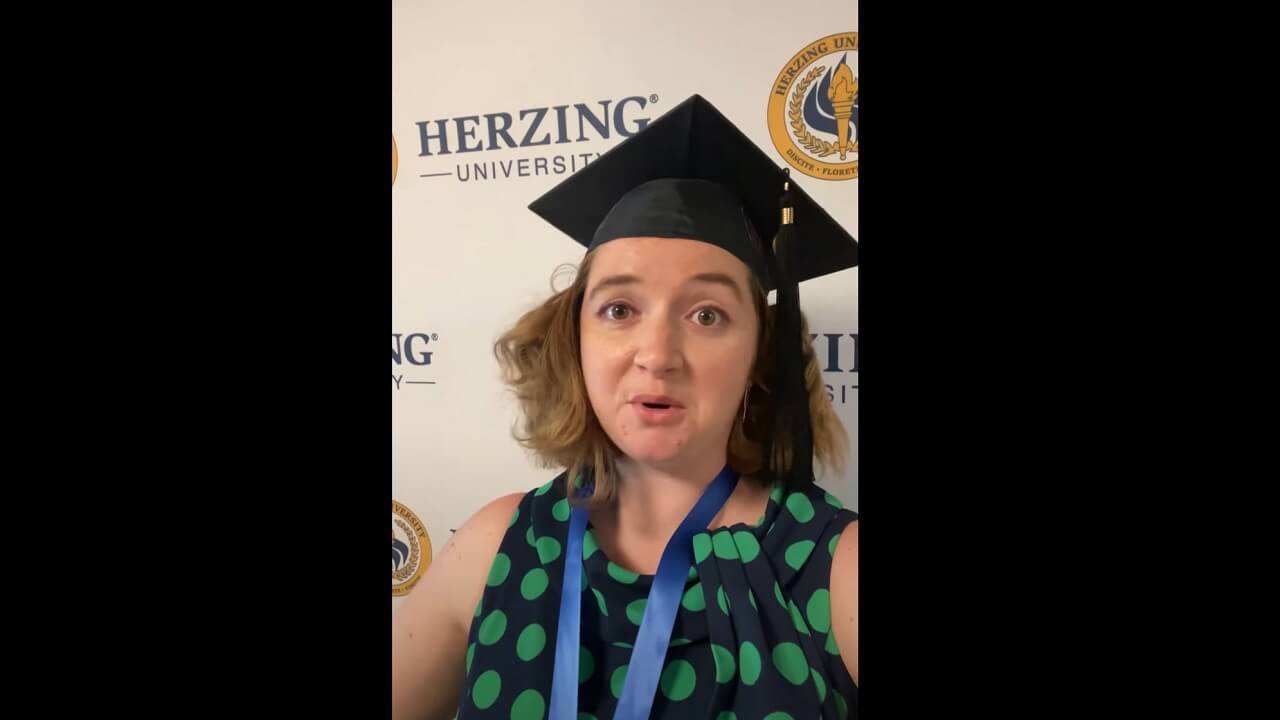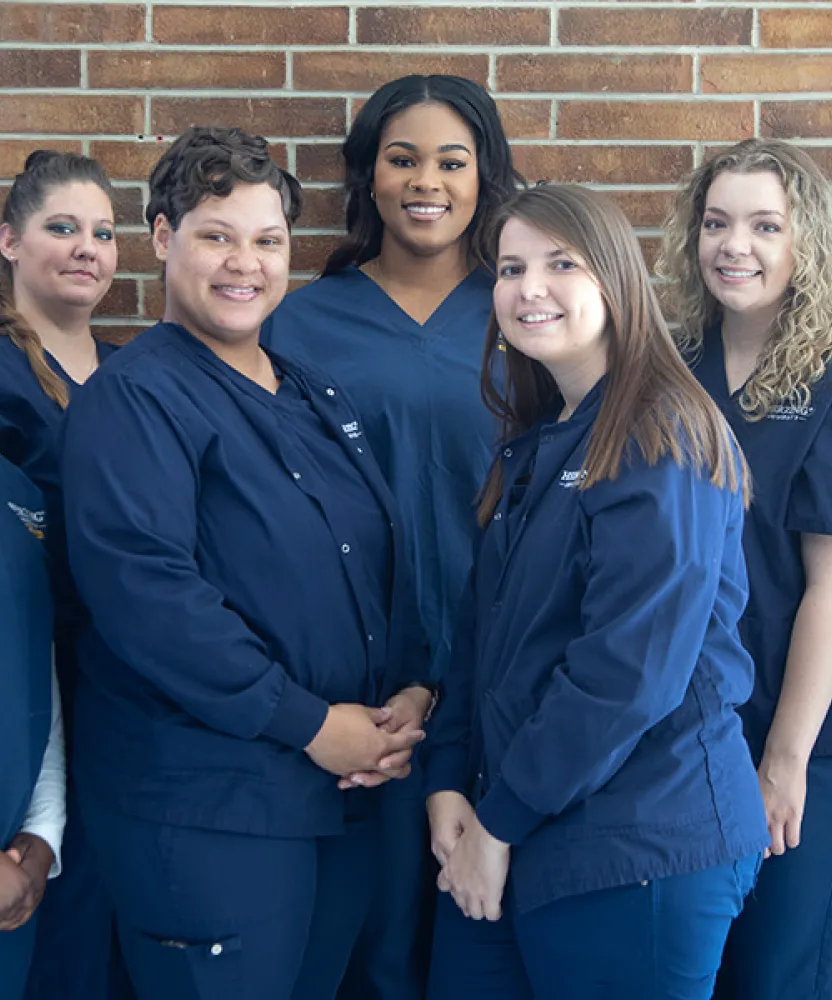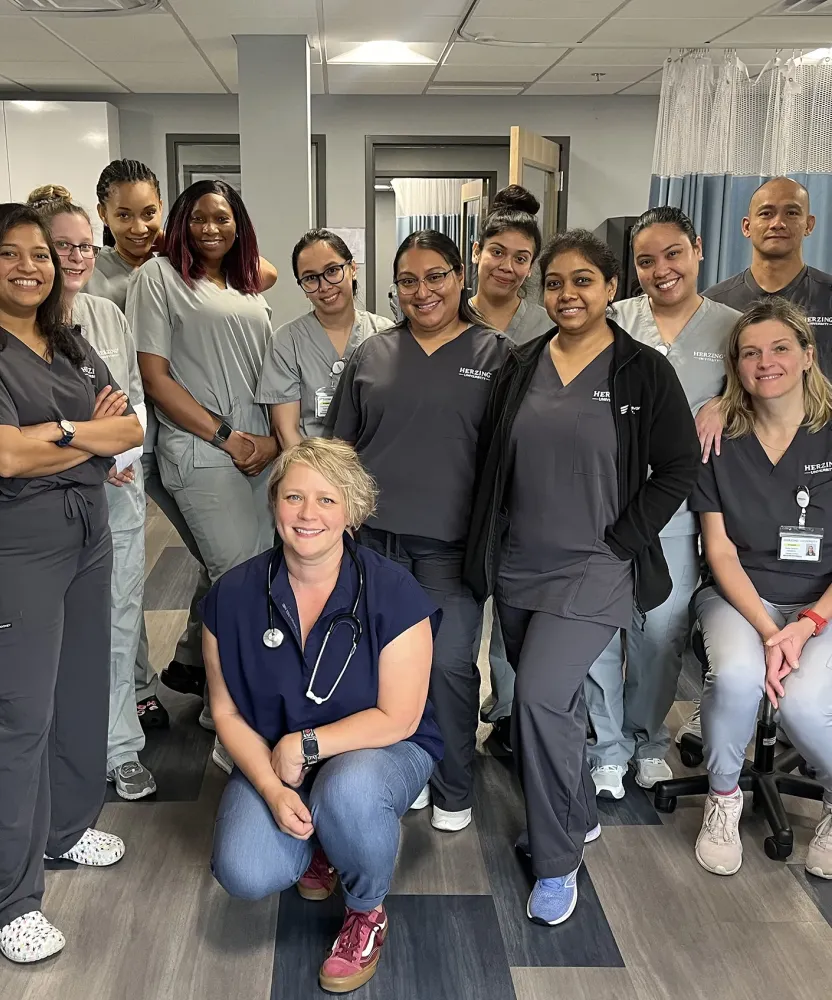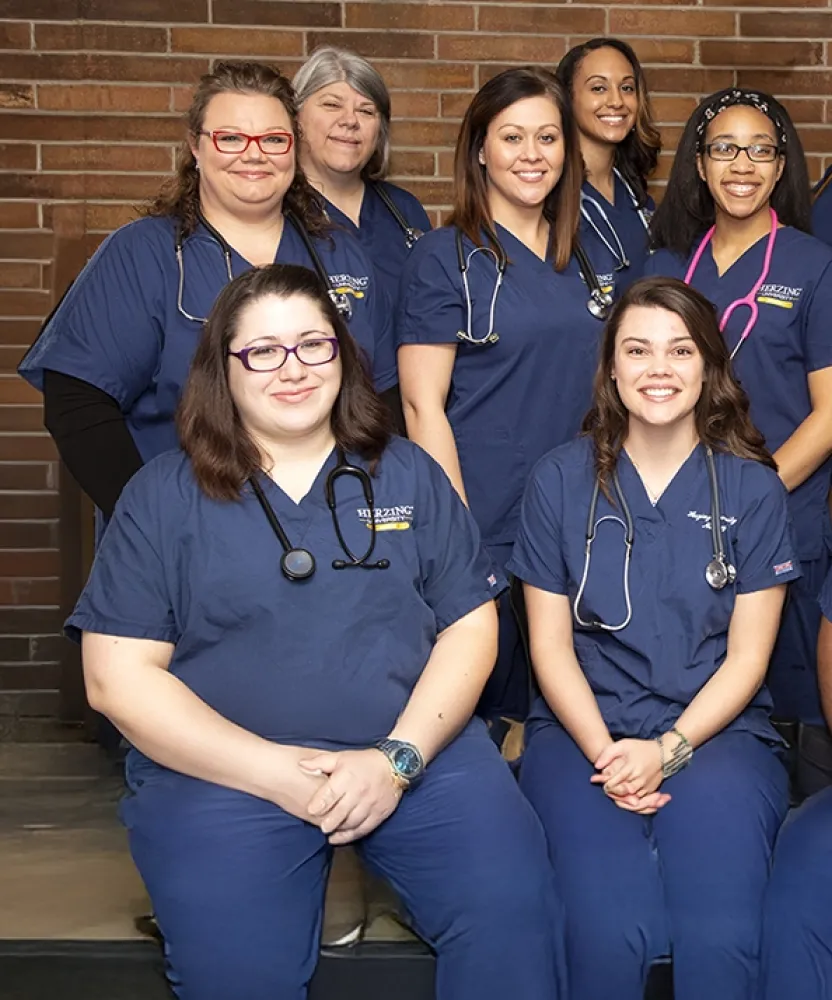Quick facts about the Accelerated BSN option in Tampa, Florida
| Accreditation | CCNE accredited,1 Accredited by the Higher Learning Commission |
|---|---|
| Program length | As few as 20 months; students who need to complete science prerequisites may require 24 months2 |
| Transfer credit | Up to 90 approved credits |
| Format | Core nursing classes at our campus in Tampa, Florida + online |
| Benefits | Experience high-fidelity simulation to enhance learning opportunities; rigorous clinical training experience with our community healthcare partners; learn from credentialed faculty with real-world hospital and patient care experience |
| QuickPaths | Earn dual credit towards a Master of Science in Nursing (MSN); transfer credit, stackable credentials, and adaptive learning technology build a faster pathway to a higher education with Herzing University |
Learn More Today!
Accelerated BSN Program Option - Tampa, FL
The Accelerated Bachelor of Science in Nursing (ABSN) option is a 120-credit undergraduate program which prepares you for a career as a registered nurse. The Tampa campus degree program provides students with a non-nursing bachelor's or master's degree with fundamental knowledge and skills in pathophysiology and pharmacology, health assessment, mental health nursing, family nursing, community nursing, nursing management, and much more.
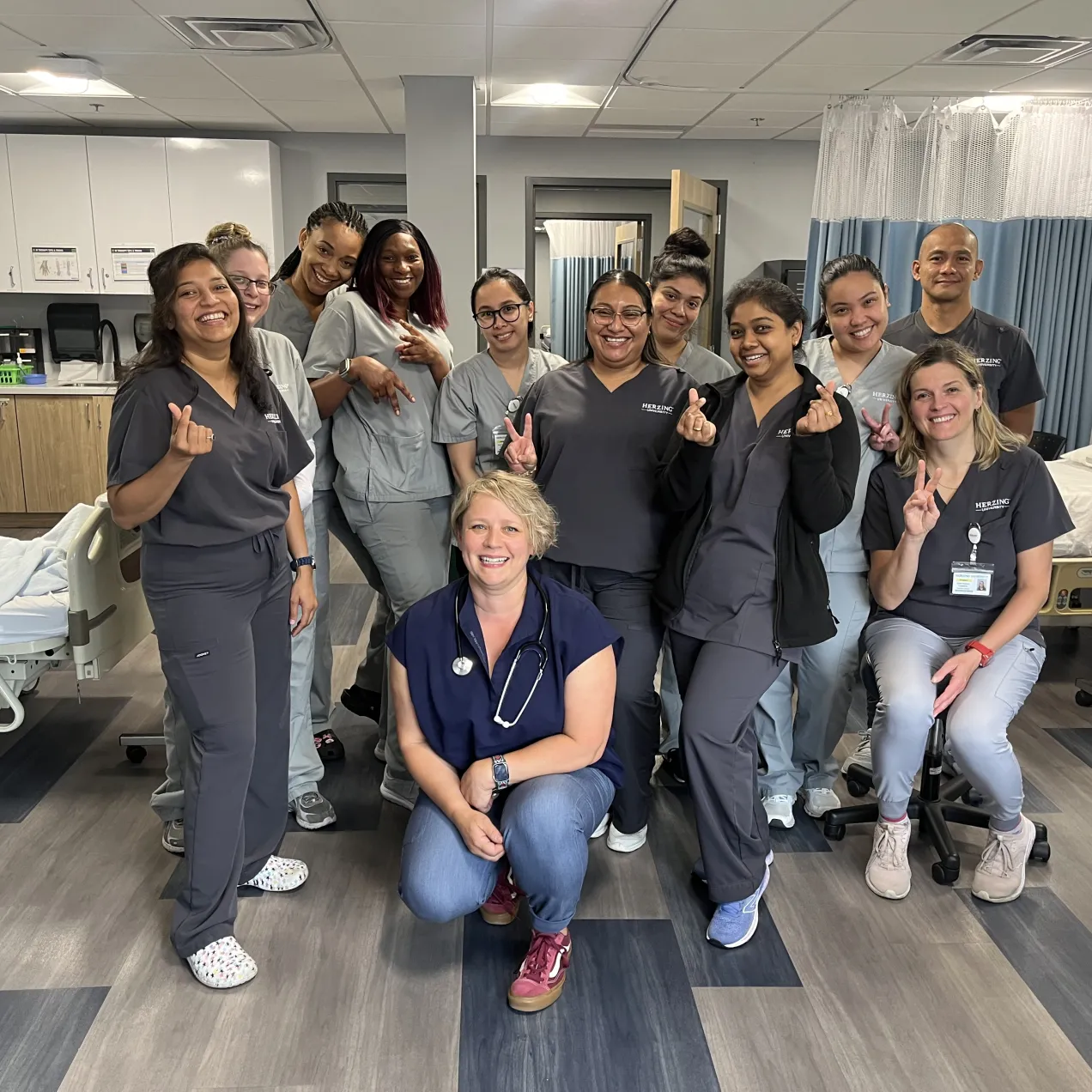
Career-focused curriculum
Discover the crucial knowledge and skills required to succeed in your work and build a foundation for continued career growth.
Flexible schedule
We work hard to help you maintain school-life balance, striving to be as flexible as possible for busy non-traditional students.
Virtual services
Access to extensive virtual services, including academic advising, tutoring, support services, technical support and library services.
Lifelong support
We support your ongoing career advancement by providing comprehensive, personalized student services with lifelong career coaching.
Rolling admissions
No application deadlines to worry about. Apply when you’re ready and prepare to get started soon.
Tampa ABSN program option classes and course schedule
Herzing University’s Tampa ABSN program option is an accredited 120-credit second degree nursing program for students who already have a bachelor’s or master's degree in another area of study.
Earn credits towards your master's degree - dual credit option. The accelerated BSN curriculum includes courses that will count towards one of our Master of Science in Nursing (MSN) online programs. This is a dual credit option that will save you time and money if you choose to pursue the next level of education in nursing.
| Program | Months i | Credits |
|---|---|---|
| Bachelor of Science in Nursing (BSN) - Accelerated BSN Option | 20 | 120 |
i. As few as 20 months. Students who need to complete science prerequisites may require 24 months to complete the program.
Required Courses in Nursing
All courses, 54.00 semester credit hours, are required.
Required Dual Credit Graduate Courses
All courses, 12.00 semester credit hours, are required. Undergraduate students in the Accelerated BSN program will be assigned to take 12.00 semester credit hours of graduate courses. Students may request to take the corresponding undergraduate course if desired. See Academic Information for full requirements under title Earning Graduate Credits as an Undergraduate Student.
Transfer Credits for General Education and Open Electives
Students enrolling in the Accelerated BSN program will receive block transfer credit for coursework completed in their previous degree. A minimum of 35.00 semester credit hours of general education and open elective credits will be awarded from a previously earned bachelor's degree. Additional transfer credits may be considered for the programmatic support and non-clinical nursing courses on a course-by-course basis.
Additional Required Courses in General Education
Students enrolled in the Accelerated BSN program must complete a minimum of 19.00 semester credit hours in general education distributed among the following disciplines. The Herzing University General Education offerings are listed below. 16.00 Semester Credit Hours in Science SC 154 Anatomy and Physiology I for Nurses Semester Credit Hours: 4.00 SC 254 Anatomy and Physiology II for Nurses Semester Credit Hours: 4.00 SC 150 Principles of Nutrition Semester Credit Hours: 2.00 SC 166 Microbiology Semester Credit Hours: 3.00 SC 186 Chemistry Semester Credit Hours: 3.00 3.00 Semester Credit Hours in Mathematics MA 320 Statistics Semester Credit Hours: 3.00 Note: Transfer students may transfer courses that are within 1.00 semester credit hour of the courses listed above to meet these discipline requirements. Science courses being transferred in from other institutions must meet the nursing program science requirements.
Special General Education Grading Requirements for Nursing Support Courses
The following science courses must be completed with a grade of "B" (80%) or better. Only two attempts are permitted for each course and a student who fails to successfully complete in the maximum attempts is subject to dismissal from the nursing program. SC 154 Anatomy and Physiology I for Nurses Semester Credit Hours: 4.00 SC 254 Anatomy and Physiology II for Nurses Semester Credit Hours: 4.00 The following general education courses must be completed with a grade of "C" (70%) or better for a student to continue in the nursing program. SC 150 Principles of Nutrition Semester Credit Hours: 2.00 SC 166 Microbiology Semester Credit Hours: 3.00 SC 186 Chemistry Semester Credit Hours: 3.00 MA 320 Statistics Semester Credit Hours: 3.00 A student who is dropped from the nursing program for failing to achieve the minimum grade specified in the courses listed above, but who otherwise meets the academic standards of the University may transfer to another Herzing degree program and/or may appeal to reapply to the BSN nursing program in a future semester. Resuming students should refer to the section on re-entering for additional requirements.
Distribution of Contact Hours by Course
Distribution of Contact Hours by Course Course Lecture Hours Lab Hours Clinical Hours Total Contact Hours Credits Block Transfer Credit 525.00 0.00 0.00 525.00 35.00 HA 610 45.00 0.00 0.00 45.00 3.00 MA 320 45.00 0.00 0.00 45.00 3.00 NSG 120 45.00 0.00 0.00 45.00 3.00 NSG 121 30.00 30.00 0.00 60.00 3.00 NSG 122 45.00 30.00 45.00 120.00 5.00 NSG 123 45.00 0.00 135.00 180.00 6.00 NSG 124 45.00 0.00 0.00 45.00 3.00 NSG 221 45.00 0.00 45.00 90.00 4.00 NSG 222 60.00 0.00 90.00 150.00 6.00 NSG 223 60.00 0.00 90.00 150.00 6.00 NSG 233 45.00 30.00 45.00 120.00 5.00 NSG 323 60.00 0.00 45.00 105.00 5.00 NSG 425 30.00 0.00 135.00 165.00 5.00 NSG 426 45.00 0.00 0.00 45.00 3.00 NU 602 45.00 0.00 0.00 45.00 3.00 NU 725 45.00 0.00 0.00 45.00 3.00 NU 730 45.00 0.00 0.00 45.00 3.00 SC 150 30.00 0.00 0.00 30.00 2.00 SC 154 45.00 30.00 0.00 75.00 4.00 SC 166 30.00 30.00 0.00 60.00 3.00 SC 186 30.00 30.00 0.00 60.00 3.00 SC 254 45.00 30.00 0.00 75.00 4.00 Totals 1485.00 210.00 630.00 2325.00 120.00
Enrollment requirements
To be considered for admission into the Accelerated BSN program in Tampa, you must:
- Hold a high school diploma or equivalent (Diploma, HSED or GED)
- Have earned a bachelor's degree from a postsecondary institution that is accredited by an agency recognized by the U.S. Department of Education or from a foreign college or university recognized as equivalent to a U.S. bachelor's degree
You must also meet the following criteria based on your cumulative GPA:
| Cumulative GPAi | Science Requirement | TEASii |
|---|---|---|
| 3.50–4.00 | None | None |
| 3.00–3.49 | 3.00 GPA in college scienceiii | None |
| 2.50 and higher | None | Composite TEAS of 66 |
i. Cumulative GPA may be calculated from all credits earned, including those in addition to the earned bachelor's degree.
ii. The Test of Essential Academic Skills (TEAS) from the Assessment Technology Institute (ATI).
iii. Based on your cumulative GPA in these college science courses: Anatomy & Physiology I and II, Biology, Chemistry, and Microbiology. Two of these courses must be used to calculate science GPA. Any of these courses completed must be included in the calculation, and no others. If you do not meet this requirement, you must score a composite score of 66 or higher on the TEAS. A grade of "B" or better must be earned for transfer credit to be awarded for Anatomy & Physiology, regardless of whether it was included in the calculation.
Waived Enrollment Fee
Discover the educational pathway designed to maximize your career potential. Reach for greater heights with Herzing University.
Find your calling as a registered nurse
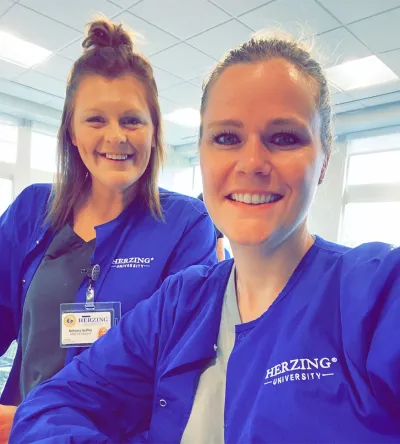
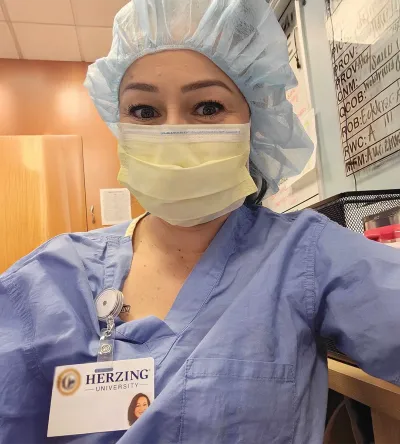

You can explore many different career opportunities as a BSN-prepared RN.
While earning a Master of Science in Nursing (MSN) can expand your duties to advanced practice across many specialties, you can also pursue different specialty roles with a BSN, including pediatrics, neonatal/NICU, oncology, neuroscience, Operating Room (OR)/surgical, and much more.
With enough experience you may consider advancing to roles in nursing education or nursing leadership. Keep in mind degree requirements may vary, including an MSN or Doctor of Nursing Practice (DNP).
We offer degree pathways to help you reach as high as you want to climb in the field of nursing.
Salary and job outlook
According to the Bureau of Labor Statistics, employment of registered nurses is expected to rise 6% from 2022-2032, and their average salary is $94,480 per year ($45.42 per hour).*
Now is a great time to begin earning the education you need to find a great job in healthcare, build a foundation for career growth and make an impact in your community.
Faq
Frequently Asked Questions
Didn't find the answer to your question? Send us an inquiry and we will be happy to answer all your questions!
There are many different nursing specialties to choose from. Depending on your personality, educational background and preferred working environment you can follow your own personalized path in the nursing profession.
Here are a few popular nursing specialties you may consider:
- Aesthetic or Cosmetic nurse
- Assisted living nurse
- Cardiac/cardiovascular nurse
- Emergency room nurse
- Flight nurse
- Home health nurse
- Labor and Delivery nurse (L&D)
- Med/surgical nurse
- Neonatal/NICU nurse
- Nurse Anesthetist
- Oncology nurse
- Pediatric nurse
- Public health nurse
- School nurse
- Travel nurse
You can take our nursing personality quiz to get a better idea of what you might prefer in your nursing career.
Our requirements for the accelerated BSN nursing program option are higher given the rigorous nature of the coursework and how fast it moves.
Herzing University’s goal is to help you find a path to a new career in nursing. If you’re worried a low GPA will keep you from being able to enroll, please get in touch with us and schedule an appointment with an admissions advisor. We may be able to work out a better solution for you.
Herzing University has no requirement for how much you can or can’t work during nursing school. Many ABSN program students work part-time while pursuing their ABSN coursework and clinicals. However, we recommend prioritizing your education as much as you can afford. The accelerated BSN program is very demanding and our priority is for you is to be successful.
With Herzing University you are never alone. It’s our goal to provide all students an affordable, career-driven education. Financial aid options include:
- Loan options – Federal & private
- Scholarships & grants
- VA / military benefits
- Other sources of financial aid
You can find an estimate for tuition and expenses by using the Herzing University tuition wizard.
If you’re considering a second career as a nurse but concerned about the workload in an accelerated program, there are several other paths you can take:
- You can first become a Licensed Practical Nurse (LPN). In 1 year you can earn a diploma in Practical Nursing and become an LPN. From there you can determine if you want to become a registered nurse.
- Get an associate’s degree and become an RN. You can earn your associate degree in nursing and become a registered nurse in 20-24 months—this is the quickest way to become an RN outside of an accelerated program. You can choose an on-campus program or our online associate in nursing (ASN) program.
- A traditional BSN program. Enroll in our 3-year bachelor’s of science in nursing program, earn your degree and become a highly qualified registered nurse. You can choose an on-campus program or our online BSN program.
It’s our goal to help you succeed in your second career. We’ll work with you to determine the best fit.
According to the Bureau of Labor Statistics, the average salary for registered nurses is $94,480 per year ($45.42 per hour)*. Nurses with a bachelor’s degree tend to fall on the upper side of that average due to their advanced education and their qualification to help hospitals earn Magnet Recognition.
The BLS projects a 6% increase in need for registered nurses from 2022-2032.* RNs are in demand, and earning a BSN can help your resume stand out and give you a better chance of getting the job you really want.
If you’re considering a second career and want to go from non-nurse to nurse practitioner, degree pathways with Herzing University include:
Option 1:
- Earn your BSN in an accelerated BSN nursing program in as few as 20 months (24 months for most students).
- Earn your master's degree through our online MSN FNP program in 20 months.
Our accelerated BSN program is available in Minneapolis, MN, Nashville, TN, Orlando, FL, Tampa, FL and 3 locations in Wisconsin (Kenosha, Brookfield and Madison).
Option 2:
- Earn a Master of Science in Nursing (MSN) in 20 months by enrolling in our online MSN Direct Entry program
- Earn a post master’s FNP certificate in 16-20 months
Our ASN program is available in Akron, OH, Birmingham, AL, Nashville, TN, Orlando, FL, and Tampa, FL. You may also elect to earn your BSN on the way by enrolling in our online RN to BSN program. Non-nurses who want to become an NP must first earn an undergraduate nursing degree before applying for an MSN program.
These are average estimates for full-time enrollment and can vary for each student. Fully commit to starting your second career and Herzing University can help you become eligible to sit for the FNP certification exam in 3-4 years to become a certified family nurse practitioner in your state.
Yes! If you’re fully committed to a new career in nursing, an accelerated BSN program is the fast track to earning your degree and getting a job with high earning potential as soon as possible.
You can expect fast-paced learning with no traditional breaks over the course of the program.
Surviving nursing school takes hard work and commitment. However, starting a new career is never easy—and a demanding profession requires demanding training.
It’s a challenge just like any other bachelor’s degree program – but compressed into a shorter window it can feel much more demanding. Rest assured you’ll have strong support every step of the way from Herzing faculty, staff and your fellow students to ensure you remain on track.
The Student Experience at Herzing
I like to try new things and you get a lot of control and flexibility through travel nursing. I didn’t expect to love it so much, but as long as I’m taking care of people, I’m happy. It doesn’t matter where it is.
Vanessa Maybin
Nursing Student | Orlando CampusHerzing would be the only school I would recommend to those making a career change, as I believe that they are the only school with realistic admissions requirements and a quality curriculum.
Bradley Fisher
Nursing Student | Brookfield/Milwaukee CampusThe accelerated program is condensed but I knew if I could get through all of that, I would be able to handle anything my career threw at me. I’m so grateful to have the opportunity to save lives by providing patient care right there at the bedside.
Jordan Sharon
Nursing Student | Orlando CampusAccreditations & Disclosures
1. The baccalaureate degree program in nursing at Herzing University Orlando is accredited by the Commission on Collegiate Nursing Education (http://www.ccneaccreditation.org). This accreditation includes the baccalaureate degree program offered at the satellite Herzing University Tampa location.
2. Students who need to complete science prerequisites may require 24 months to complete the program.
Herzing University is accredited by the Higher Learning Commission (hlcommission.org), an institutional accreditation agency recognized by the U.S. Department of Education.
* Bureau of Labor Statistics (BLS), U.S. Department of Labor, Occupational Employment and Wage Statistics 2023 / Occupational Outlook Handbook 2022. BLS estimates do not represent entry-level wages and/or salaries. Multiple factors, including prior experience, age, geography market in which you want to work and degree field, will affect career outcomes and earnings. Herzing neither represents that its graduates will earn the average salaries calculated by BLS for a particular job nor guarantees that graduation from its program will result in a job, promotion, salary increase or other career growth.
Recent Blog Posts
Waived Enrollment Fee
Discover the educational pathway designed to maximize your career potential. Reach for greater heights with Herzing University.

